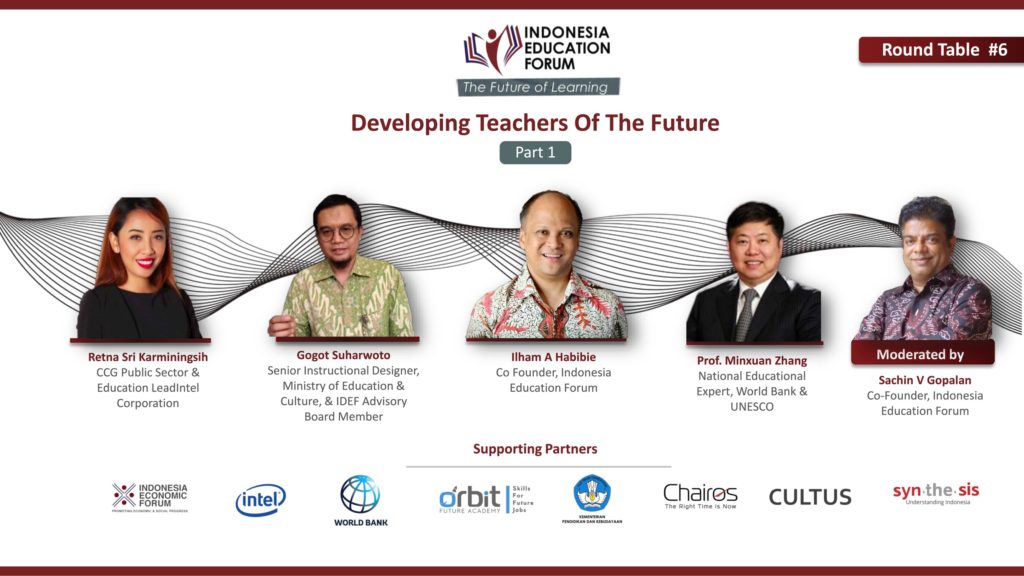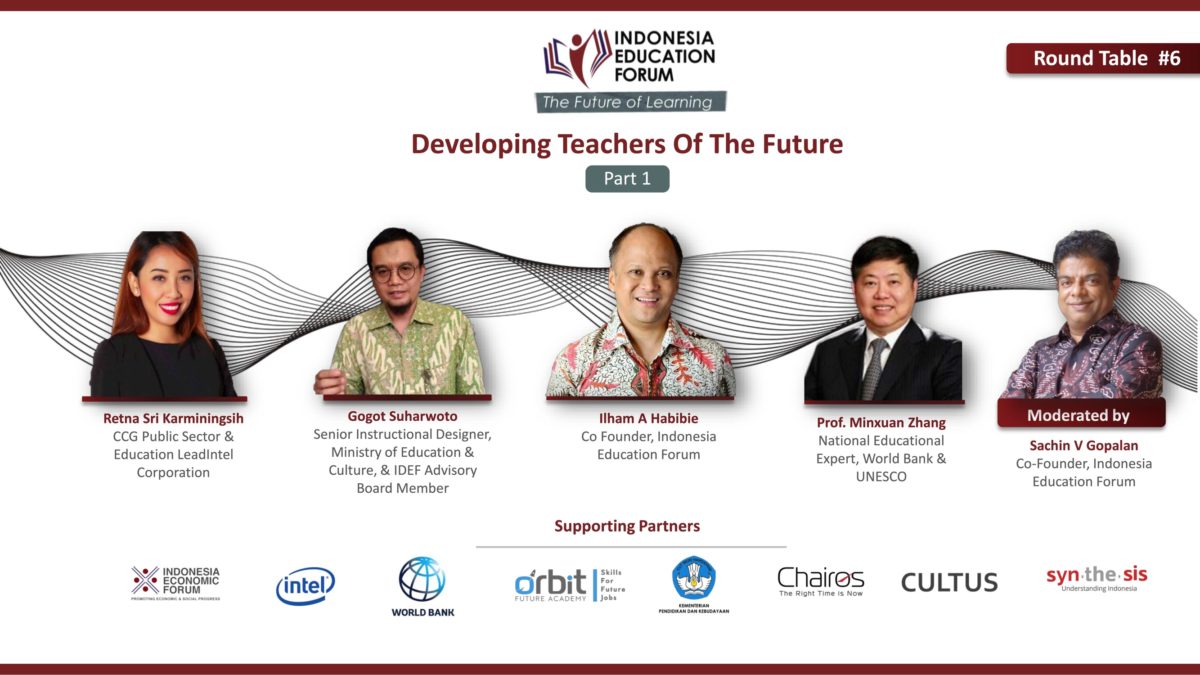Theme: Developing Teachers of the Future (Part 1 of 2)

Jakarta, August 26th 2020 –As the 4th largest education system in the world, Indonesia has never reached the top 10 in the world rankings such as the Program for International student Assessment by OECD. During latest test in 2018, Indonesia only ranked somewhere near 70th. The lack of quality teachers remains one of the biggest challenges facing Indonesia in the coming decades.
With over 4 million teachers, 60 million students and 565,000 schools, Indonesia is in need of reshaping its education policy and curriculum, especially in the teacher training area. The more challenging part is that Indonesia has diverse cultures and thousands of islands spread across the country. So it becomes a real challenge to be able to reach high quality training and building procurement resources.
The Indonesia Education Forum, in collaboration with Intel Corp, Orbit Future Academy, Chairos International Ventures, Synthesis Indonesia, Cultus and the Indonesia Economic Forum hosted a webinar on how Indonesia should shape the future of teacher training from a global perspective and experience. The session was hosted by Sachin V Gopalan, co-founder of the Indonesia Education Forum and involved participants ranging from policy makers to educators to infrastructure providers and platform developers.
“Today’s topic is about providing some insight into the challenges and opportunities that are there for the companies, that are operating in this space. If one has to train 4 million or close to 5 million teachers, and they need to hire something close to 60-70,000 teachers, it is very complex process. How do we bring them on to get them to a level where they are able to standardize the quality across the nation, also to adjust to the language and cultural backgrounds, and meet the requirements of local jobs, that is big challenge if you want to standardize teacher training. So today we want to incorporate some global views on the issue,” said Sachin VGopalan, co-founder of the Indonesia Education Forum.
Several key topics emerged from the discussion.
In opening the discussion, Dr. -Ing Ilham A Habibie, MBA, Co-Founder, Indonesia Education Forum laid out three key factors that would impact the future of teacher training.
First, the role of the teacher for future learning is crucial. In the traditional schools, a teacher’s role is to provide knowledge and information, and to basically answer questions. Much of that in the future can be taken over by other means and technology such as AI, computer-based on demand learning etc. But there are other roles that will come to the fore in the future for teachers to become mentors, motivators, provide inspiration and share their experience with students on a personal level.
“Secondly, there will be a marriage between online and offline learning in the future. Teachers will continue to use online tools and try to enrich that with something that they can do onsite or in class. But part of offline learning is still needed. Project-based learning for example cannot be done online as it involves working in groups to share experience and knowledge,” he noted.
Thirdly, there is a need to introduce STEAM (science, technology, engineering, art and math), project based learning and makers school into the school curriculum going forward, particularly if the country is to meet the demands and need of Industry 4.0. Indonesia, along with many other nations, needs to increase the number of engineering, science and technology graduates as the numbers have been falling in the past. “The only way to reverse this trend is by having a different approach to learning, providing hands on experience in parallel with teaching. And that can only be done by good alternatives to the philosophy of steam or maker school. It’s not only the curriculum but also the way of learning and then you have to basically do project based, hands on week by week. And for that, teachers need different kind of skill.”
“Should we scale up existing teachers or should we take new kind profile of the teacher? I think we have to learn about their psychology. We can’t only learn math, physics, biology and the languages. And in today’s world, the role of teachers has become more important especially since there is so much information and knowledge floating around but the most important thing is about understanding where you put it right. Students need guidance from somebody who has more experience to getting things in context, understanding the validity of information in a particular situation, I think that is much more important than having the information itself at hand,” said Ilham A Habibie.
Prof. Minxuan Zhang, Education Expert at the World Bank based in Shanghai, China and also Head of UNESCO Teacher Training Center in Shanghai shared his experience on developing teachers’ training framework. Since Shanghai has very strong testing culture, the government is motivated to join PISA (Programme for International Student Assessment) by OECD. The country joined PISA in 2009 and Teaching and Learning International Surveys (TALIS) later in 2013 to learn the methods and techniques for policy improvement, testing and evaluation and to formulate their long-term education development plan 2010-2020 based on evidence and information.
“Our students obtained back-to-back (2009, 2012, 2015 and 1018) world’s top achievement in reading, math and science in PISA rankings. And for TALIS, Shanghai also achieved higher than average compared to OECD countries. For instance financial support received by teachers for interview training scored 84% from an average of 46% and teacher participation in interview training activities took 62 days versus 27 days. Only in use ICT for the student project we were not so good back when we joined the test in 2013. We were later recognized by the World Bank for our efforts and we also undertook teachers’ exchange with the UK, especially teachers in mathematics with 100 teachers per year. In 2017 UNESCO approached us to establish the education center,”
What Shanghai did to develop teachers over the past 10 years was to set up a triangle interrelated system of teacher development policies, consisting of: teachers career development ladders; performance evaluation; and reward and in service training. Teachers from junior (entry), middle and senior (expert) level were given career ladders for their professional development. If teachers wanted to climb the ladder they should have very good, effective and efficient teaching practices and were evaluated each year. If teachers can level up, the government would give them in service training where all costs were covered by the state.
The triangle system also monitored teachers’ personal motivation and sophisticated governmental mechanisms. Only through such methods were the Shanghai authorities able to better public education. Shanghai also planned six teacher competences for future learning: competence for moral cultivation in modern global society; disciplinary knowledge and skills; design capacity for exercises and tests; experiment capacity for the fifth generation where students design and conduct their own experiments; ICT and AI capacity; and career and study guidance.
“My advice to Indonesia is to follow the US model of focusing on the poorer schools and provide them with greater resources so they can improve their capacity and this way raise the quality of education across the country,” Prof. Minxuan Zhang noted. “The most important thing for the government is how to raise the quality of the bottom schools. This is very important especially for countries like Indonesia and China where we have very large populations and where manpower is the most important resource for us.”
Addressing questions raised from the participants on how China instills creativity alongside with their STEAM curriculum, Prof Zhang admitted that Shanghai maintains the balance between learned knowledge and encouraging students to acquire knowledge by themselves. In this way students can improve their innovation, creativity and knowledge.
He also addressed a question on which institution should train teachers. China and Shanghai use different channels since each has its own advantages and shortcomings. Universities for instance, usually offer degrees and systematic knowledge but are not so good at raising capacity and problem solving in the classroom. While teacher development institutions fulfill this role, they can only give non theoretical suggestions. The answer is therefore to utilize various channels to train teachers to achieve maximum results.
Retna Sri Karminingsih, Intel Public Sector & Education Lead, shared her view that the current period is a challenging one for education and economic development in Indonesia especially for teachers. Teachers are being pushed to fulfill tasks they never faced before such as conduct distance learning classes but without proper training and resources.
As leading technology industry player, Intel developed an e-learning guide to assist teachers, students and parents to better cope with technology during the transition to distance learning. The guidance can be accessed at www.k12blueprint.com. Some teachers already utilize school systems that have fully shifted into online instruction.
“I expect this guidance can help them to adjust themselves in the new normal, by changing academic standards and giving students time to identify their own interests and maintain their spirit and creativity. It will help student learning very much in the future. To prepare your classroom for e-learning and instruction, schools need to undertake four steps: set up your virtual environment; adapt your lesson for e-learning; get the right tools and technologies; and explore innovative skill development. Currently all teachers face the same challenge: speed in making the transition into e-leaning,” she said.
Gogot Suharwoto, Senior Instructional Designer, Ministry of Education & Culture, & IDEF Advisory Board shared two updates on the current distance learning government policy. The government has implemented two new policies: expanding face-to-face learning for the yellow zone where it is allowed for all levels of schooling from the previously green zone. The government has also provided curriculum under emergency conditions where schools are given the flexibility to choose a curriculum that suits the learning needs of students.
“Currently 57% students are still in the red and orange zone (238 districts or cities) while the rest of the 43% are in yellow and green zones (276 districts or cities). Of the 532,271 schools, currently only 90,624 (17.03%) are included in the ministry data system. From the reported schools, 78,935 (87.10%) are carrying on learning from home and the rest 11,689 (12.9%) are carrying face-to-face learning,” he said.
From the curriculum perspective, schools are given three curriculum implementation options: keep using the 2013 national curriculum; use the emergency curriculum under special conditions; and to customize or simplify the curriculum independently. “We also want to share good news that through our platform for school procurement information system (SIPLah), there are 63,000 schools using this platform with the transaction value reaching US$342 million up to now. We also have marketplace partners such as Inti, Eureka Book House, Toko Ladang, Pesona Edu, Siplah Blanja, Blibli and we are still open for taking on other partners,” he said.
About Indonesia Education forum
Indonesia Education Forum (IDEF) has a mission to be an influential networking platform for all stakeholders of Indonesia’s Education Sector. We do this through a series of roundtables, reports, events and activities throughout the year. Please Contact us if you would like to sponsor or participate in the Indonesia Education Forum. IDEF is an initiative of The Indonesia Economic Forum, a thought leadership platform aimed at promoting economic and social progress in Indonesia. For more information, please visit www.indonesiaeducationforum.com

